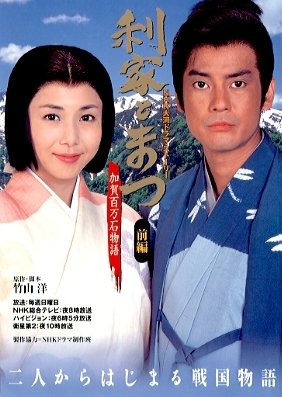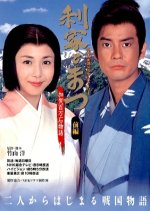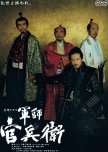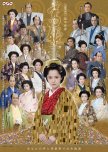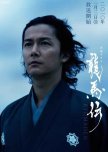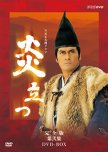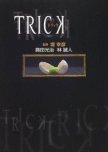Malgré l'opposition de son père, Maeda Toshiie, guerrier expert dans le maniement de la lance, choisit de se rallier à Oda Nobunaga dont il devient vite un des plus proches soldats, avant de tomber tout aussi vite en disgrâce. Grâce aux efforts de sa compagne Matsu, il finit quand même par faire son retour aux abords du cercle des puissants au centre duquel trône Oda mais a pris du retard par rapport à Toyotomi Hideyoshi ou Akechi Mitsuhide dans la course au pouvoir. (Source: Nautiljon) Modifier la traduction
- Français
- English
- magyar / magyar nyelv
- dansk
- Titre original: 利家とまつ〜加賀百万石物語〜
- Aussi connu sous le nom de: Toshiie to Matsu , Toshiie and Matsu / Love Shines Through.
- Réalisateur: Inoue Tsuyoshi, Motoki Kazuhiro, Iseda Masaya, Mineyo Sato
- Genres: Historique, Drame, Politique
Distribution et équipes
- Karasawa ToshiakiMaeda Toshiie / MatazaemonRôle principal
- Matsushima NanakoMatsuRôle principal
- Sorimachi TakashiOda NobunagaRôle Secondaire
- Takenouchi YutakaSawaki Yoshiyuki [Toshiie's younger brother]Rôle Secondaire
- Matsudaira KenShibata KatsuieRôle Secondaire
- Kagawa TeruyukiToyotomi HideyoshiRôle Secondaire
Critiques

The key word is, of course, together; it’s impossible to imagine one without the other. Theirs is a deeply romantic story, an enduring love that blossomed and thrived despite the power struggles ravaging the country around them. The script manages to illustrate this bond beautifully, intertwining gentle domestic sequences with historical events important to the Maeda. Viewers become quickly immersed in the warm-hearted couple, their family and friendships. However, unless one is familiar with Toshiie’s place in history, it is difficult to justify why anyone needs to see this era through his eyes—at least until the second half of the drama. After a certain event, the pace picks up and the stakes rise dramatically, conspiring to draw Toshiie center stage. This is where Toshiie and Matsu shines; all of the emotional groundwork in the first half lends itself to a veritable explosion of emotion in the second, which is immensely satisfying and heartbreaking all at once. And that ending ...! Masterfully done.
As expected of a taiga, the cast is enormous. Karasawa Toshiaki and Matsushima Nanako star as Toshiie and Matsu respectively, and while Karasawa is everything a samurai should be, Matsushima steals the show. Her turn as the strong-willed, upright Matsu, respected even by Oda Nobunaga, is career-defining. Sorimachi Takashi, our Nobunaga this time around, is memorable, carrying intimidation even in his posture; his signature line “De aru ka?” is a running gag throughout the series. Kagawa Teruyuki is again quirky and energetic as Hideyoshi, which is by turns brilliant and tiresome—there are times I felt he missed crucial nuance other actors playing the same role have knocked out of the park. Additional highlights include Matsudaira Ken as Shibata Katsuie, tragic mentor to Toshiie and Oikawa Masahiro in the role of Maeda Keijiro, who brightened later episodes with his very presence.
The soundtrack, composed by Watanabe Toshiyuki, is elegant and fitting. I was particularly impressed with the sweeping romantic theme, especially played over the sweet introduction featuring our protagonists.
Cet avis était-il utile?

